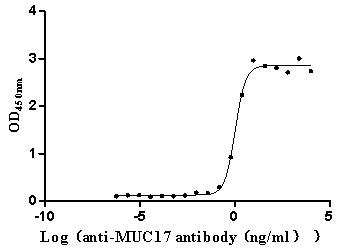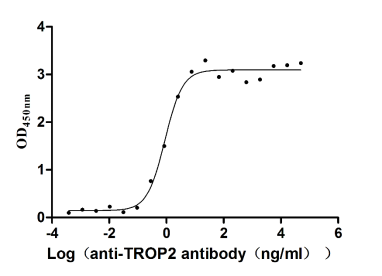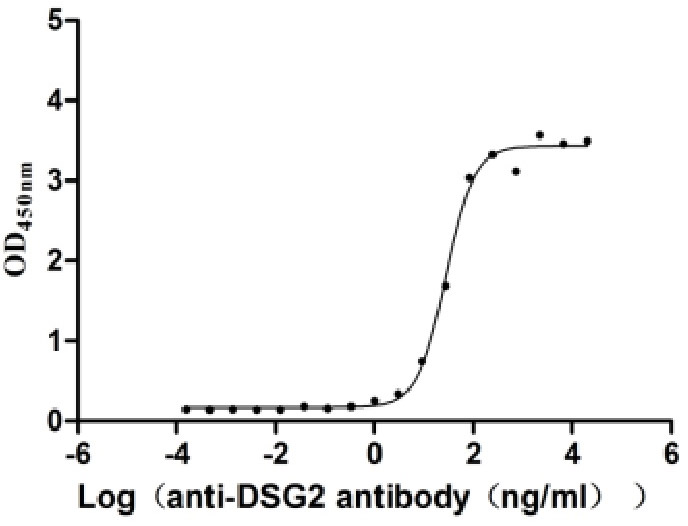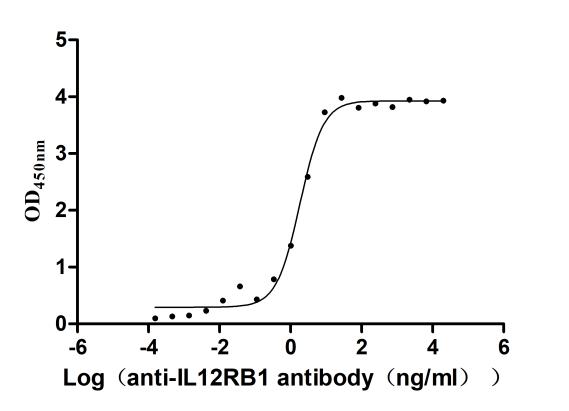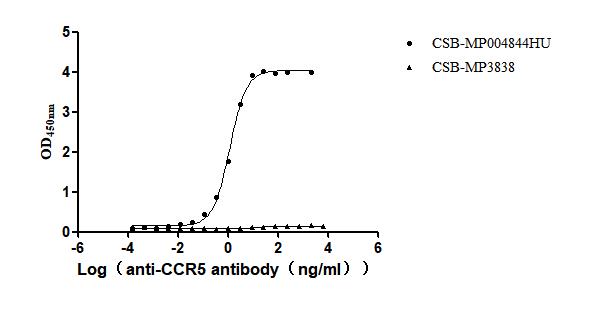Recombinant Human Cyclin-dependent kinase inhibitor 3 (CDKN3)
-
货号:CSB-EP005096HU
-
规格:
-
来源:E.coli
-
其他:
-
货号:CSB-EP005096HU-B
-
规格:
-
来源:E.coli
-
共轭:Avi-tag Biotinylated
E. coli biotin ligase (BirA) is highly specific in covalently attaching biotin to the 15 amino acid AviTag peptide. This recombinant protein was biotinylated in vivo by AviTag-BirA technology, which method is BriA catalyzes amide linkage between the biotin and the specific lysine of the AviTag.
-
其他:
-
货号:CSB-BP005096HU
-
规格:
-
来源:Baculovirus
-
其他:
-
货号:CSB-MP005096HU
-
规格:
-
来源:Mammalian cell
-
其他:
产品详情
-
纯度:>85% (SDS-PAGE)
-
基因名:Name:CDKN3 Synonyms:CDI1, CIP2, KAP
-
Uniprot No.:
-
别名:CDI1; Cdk associated protein phosphatase; CDK2 associated dual specificity phosphatase; CDK2-associated dual-specificity phosphatase; CDKN3; CDKN3_HUMAN; CIP2; Cyclin dependent kinase inhibitor 3; Cyclin dependent kinase interacting protein 2; Cyclin dependent kinase interactor 1; Cyclin-dependent kinase inhibitor 3; Cyclin-dependent kinase interactor 1; Cyclin-dependent kinase-interacting protein 2; FLJ25787; KAP; KAP1; Kinase associated phosphatase; Kinase-associated phosphatase; MGC70625; OTTHUMP00000178991
-
种属:Homo sapiens (Human)
-
蛋白长度:full length protein
-
表达区域:1-212
-
氨基酸序列MKPPSSIQTS EFDSSDEEPI EDEQTPIHIS WLSLSRVNCS QFLGLCALPG CKFKDVRRNV QKDTEELKSC GIQDIFVFCT RGELSKYRVP NLLDLYQQCG IITHHHPIAD GGTPDIASCC EIMEELTTCL KNYRKTLIHC YGGLGRSCLV AACLLLYLSD TISPEQAIDS LRDLRGSGAI QTIKQYNYLH EFRDKLAAHL SSRDSQSRSV SR
-
蛋白标签:Tag type will be determined during the manufacturing process.
The tag type will be determined during production process. If you have specified tag type, please tell us and we will develop the specified tag preferentially. -
产品提供形式:Lyophilized powder
Note: We will preferentially ship the format that we have in stock, however, if you have any special requirement for the format, please remark your requirement when placing the order, we will prepare according to your demand. -
复溶:We recommend that this vial be briefly centrifuged prior to opening to bring the contents to the bottom. Please reconstitute protein in deionized sterile water to a concentration of 0.1-1.0 mg/mL.We recommend to add 5-50% of glycerol (final concentration) and aliquot for long-term storage at -20℃/-80℃. Our default final concentration of glycerol is 50%. Customers could use it as reference.
-
储存条件:Store at -20°C/-80°C upon receipt, aliquoting is necessary for mutiple use. Avoid repeated freeze-thaw cycles.
-
保质期:The shelf life is related to many factors, storage state, buffer ingredients, storage temperature and the stability of the protein itself.
Generally, the shelf life of liquid form is 6 months at -20°C/-80°C. The shelf life of lyophilized form is 12 months at -20°C/-80°C. -
货期:Delivery time may differ from different purchasing way or location, please kindly consult your local distributors for specific delivery time.Note: All of our proteins are default shipped with normal blue ice packs, if you request to ship with dry ice, please communicate with us in advance and extra fees will be charged.
-
注意事项:Repeated freezing and thawing is not recommended. Store working aliquots at 4°C for up to one week.
-
Datasheet :Please contact us to get it.
相关产品
靶点详情
-
功能:May play a role in cell cycle regulation. Dual specificity phosphatase active toward substrates containing either phosphotyrosine or phosphoserine residues. Dephosphorylates CDK2 at 'Thr-160' in a cyclin-dependent manner.
-
基因功能参考文献:
- Results demonstrate that upregulation of p27 is involved in the knockdown of CDKN3-induced decrease in cell proliferation, increase in cell cycle arrest and apoptosis, decrease in invasion, and increase in radiosensitivity. PMID: 28109073
- the mechanism of CDKN3 overexpression in human cancer PMID: 28504190
- CDKN3 is frequently upregulated in gastric cancer tissues and cell lines and is related to advanced clinical stage, recurrence, and poor clinical outcome in gastric cancer. The functional data strongly suggest that CDKN3 behaves as an oncogene in gastric cancer, and downregulation of CDKN3 could inhibit gastric cancer cell proliferation, migration, and invasion, and induce cell cycle arrest and apoptosis. PMID: 27983933
- CDKN3 may act as a tumor suppressor in liver tissues by modulation of the cell survival signal transduction, monitoring carcinogenesis and elimination of abnormal cells. PMID: 27314282
- These results suggest that CDKN3 acts as an oncogene during breast cancer progression. The in vitro silencing of CDKN3 promoted apoptosis, induced G1 phase cell cycle arrest and inhibited cell migration. PMID: 27314680
- Knockdown of Cdkn3 stabilizes Mps1 at centrosomes. PMID: 26586430
- CDKN3 mRNA may be a good survival biomarker and potential therapeutic target in cervical cancer PMID: 26372210
- CDKN3 overexpression in lung adenocarcinoma is not attributed to alternative splicing or mutation but is likely due to increased mitotic activity, arguing against CDKN3 as a tumour suppressor PMID: 26554648
- CDKN3 knockdown reduces cell proliferation, invasion and promotes apoptosis in human ovarian cancer cells. PMID: 26191143
- These results highlight the importance of CDKN3 in Bcr-Abl-mediated leukemogenesis. PMID: 25360622
- High CDKN3 expression is associated with colorectal cancer. PMID: 25735390
- these data identify KAP as a major regulator of cell division via interactions with numerous target proteins. aberrant splicing or miR-26a decreases KAP expression to promote glioblastoma growth and invasion. PMID: 24704824
- CDKN3 may play an important role in the development and proliferation of epithelial ovarian cancer PMID: 24573179
- KAP is overexpressed in alcohol-related hepatocellular carcinoma. PMID: 23292002
- RelB activation is key for promoting multiple myeloma cell survival through the upregulation of anti-apoptotic proteins, in particular, CIAP2. PMID: 23555623
- CDKN3 controls mitosis through the CDC2 signaling axis. PMID: 23775190
- High CDKN3 expression is associated with cervical cancer. PMID: 23405241
- cyclin-dependent kinase-associated protein phosphatase expression was associated with poorly differentiated Renal cell carcinoma PMID: 21396835
- These results suggest that CDKN3 acts as an oncogene in human hepatocellular carcinoma and antagonism of CDKN3 may be of interest for the treatment of HCC. PMID: 22390936
- analysis of CDKN3 cell cycle networks and the molecular mechanism of non-malignancy associated hepatitis/cirrhosis and HCC transformation PMID: 21535270
- Identification of a KAP domain that interacts with cyclin-dependent kinase 2. PMID: 12745075
- In choline-deficient neuroblastoma cells, the promoter of the cyclin-dependent kinase inhibitor 3 gene (CDKN3) was hypomethylated. This was associated with increased expression of CDKN3 gene product kinase-associated phosphatase (KAP) PMID: 15147518
- Pax3 represses transcription through a novel mechanism involving competition between corepressor KAP1 and the heterochromatin-binding protein HP1gamma PMID: 16945326
- the reduction of KAP1 levels promotes p53-dependent p21 induction and inhibits cell proliferation in actinomycin D-treated cells. PMID: 17056014
显示更多
收起更多
-
相关疾病:Hepatocellular carcinoma (HCC)
-
亚细胞定位:Cytoplasm, perinuclear region.
-
蛋白家族:Protein-tyrosine phosphatase family
-
数据库链接:
HGNC: 1791
OMIM: 114550
KEGG: hsa:1033
STRING: 9606.ENSP00000335357
UniGene: Hs.84113
Most popular with customers
-
Recombinant Human Insulin growth factor-like family member 1 (IGFL1) (Active)
Express system: Mammalian cell
Species: Homo sapiens (Human)
-
Recombinant Human Poliovirus receptor (PVR) (I340M), partial (Active)
Express system: Mammalian cell
Species: Homo sapiens (Human)
-
Recombinant Human Mucin-17 (MUC17), partial (Active)
Express system: Mammalian cell
Species: Homo sapiens (Human)
-
Recombinant Human Tumor-associated calcium signal transducer 2 (TACSTD2), partial (Active)
Express system: Mammalian cell
Species: Homo sapiens (Human)
-
Recombinant Human Desmoglein-2 (DSG2), partial (Active)
Express system: Mammalian cell
Species: Homo sapiens (Human)
-
Recombinant Human Interleukin-12 receptor subunit beta-1(IL12RB1),partial (Active)
Express system: Mammalian cell
Species: Homo sapiens (Human)
-
Recombinant Human C-C chemokine receptor type 5 (CCR5)-VLPs (Active)
Express system: Mammalian cell
Species: Homo sapiens (Human)


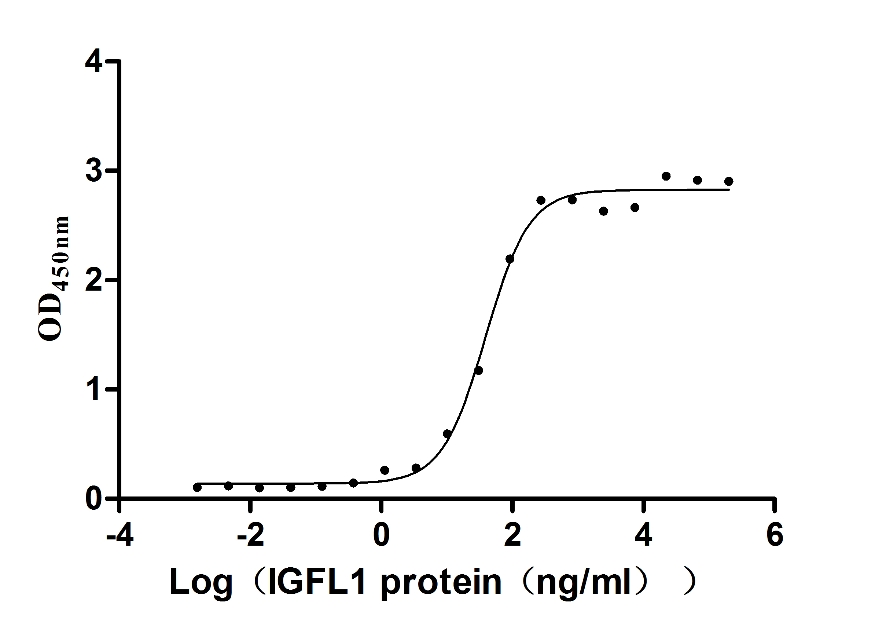
-AC1.jpg)
